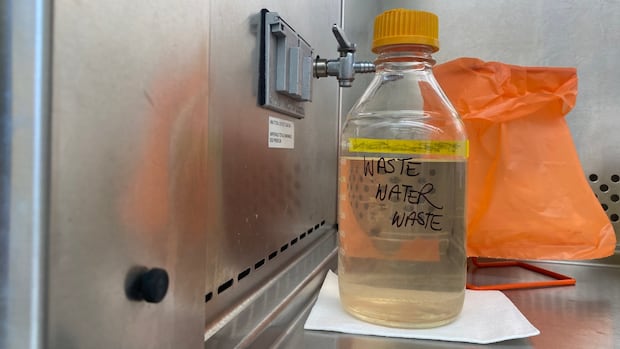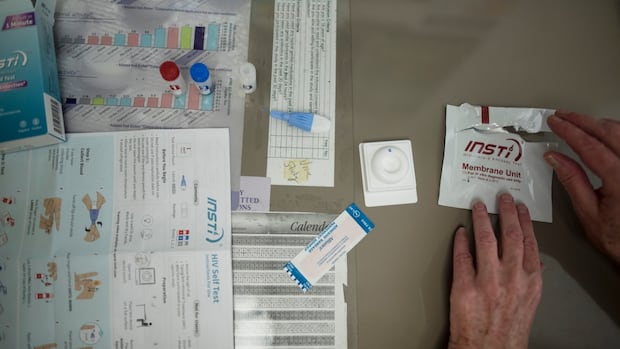WARNING: This article references sexual abuse and may affect those who have experienced sexual violence or know someone impacted by it.
In the depths of her addiction, Crystal Pickering thrived on chaos.
She started using drugs as a teenager to cope with childhood physical and sexual abuse. Growing up in Sault Ste. Marie, Ont., she says she wasn’t encouraged to express her emotions, and the anger she felt had festered for years.
“I was a dealer. I did all that and it was the power of the chaos — I loved it,” she said. “If I had the coke and the bags, I was the shit. If I was tough and I could beat up somebody. I was important.
“My aggressiveness was what made me who I was.”
But after years of working to get control of her life, she’s set to finalize a remarkable personal achievement: getting her high school diploma at age 41.
Next week, Pickering is graduating from the Lakehead Adult Education Centre (LAEC) in Thunder Bay.
“I still can’t believe it’s happening,” she said. “I never thought I’d see the day.”
When you’re in addiction, you just feel stuck, you feel like that’s it for you, but it’s not. I promise you that there is another way, and I am walking, breathing proof of it.– Crystal Pickering
Pickering’s personal struggles began after she gave birth to her first child, Jason, when she was 17. While he was in kindergarten, she had another son without knowing she was pregnant until she gave birth. He died when he was three months old of hydranencephaly — a rare birth defect that affects brain development.
Pickering said she immediately turned to crack cocaine, “and my life’s been just crazy, like a roller-coaster, since then.”
She was in and out of detox for years. After her grandmother died, she became an intravenous drug user.
“I was shooting up coke, crystal meth, heroine, fentanyl, using puddle water to do it because I didn’t have any water in my car.”
Her turning point was when a police officer found her, and instead of putting her in a jail cell, he brought her to the mental health ward.
“I would just do anything to hug that cop,” Pickering said. “It was his decision to take [me] to the hospital that saved my life.”
‘She just wouldn’t give up on me’
The hospital staff told Pickering she would never recover in her hometown, where she was too connected with the drug scene. So she was sent to Thunder Bay’s Crossroads Centre, a pre- and post-treatment recovery home.
At the time, Pickering’s motivation to get sober was fuelled by her desire to deal drugs instead of consume them. But at the Lodge on Dawson, which offers transitional housing for those experiencing mental health and addiction issues, she met Dayna Elizabeth Karle, who became her roommate.
Karle insisted on befriending her and, eventually, Pickering opened up.
“She just wouldn’t give up on me,” Pickering said.
In time, Pickering found belonging in Thunder Bay’s recovery community. She’s now seven years into recovery from addiction.
“That’s when I realized that people have trust in me. When I use my words nicely instead of trying to be a hothead … this is who I wanted to be.”

In September 2021, Karle died of an accidental overdose when she was 31. Carolyn Karle started the DEK Foundation in her daughter’s name with the goal of eventually opening a post-treatment recovery home for women.
“I know she’s looking down on her mom and being like, ‘I’m so grateful for you right now,'” said Pickering.
Pickering has become an integral member of Team DEK and offers peer support at Crossroads, using her lived experience to build relationships with clients.
“That’s why they feel comfortable around me,” she said. “I understand what they’re talking about and they are a big, big factor in my recovery.”
Going back to school
For Pickering, finally getting serious about completing high school came with its own challenges.
As a youngster, she was always sent to the back of the class or out into the hallway. She tried to return to school several times since then, without success.

But at LAEC, “I’ve never felt like I was out of place there once and they embraced everything about me,” she said.
About 1,500 students take courses at LAEC each year, to complete their Ontario Secondary School Diploma, get credits for post-secondary school, study English as a second language or to develop essential life skills, said Samantha Peotto, the education centre’s manager.
The school also works with the Thunder Bay Correctional Centre and District Jail as well as First Nations, and offers online programming with connections through Contact North.

“The goal is to create a safe space for students and [for them] to know that you can always come back in, no matter what, even if it didn’t work out the first time, or the second time or the third time,” Peotto said.
Kara Babcock, a LAEC adult and continuing education teacher, said the biggest challenge her students face is having faith in themselves.
“I find that one of my main roles as the teacher in their classroom is just to help them rediscover their confidence in their abilities and remind them that lifelong learning is something that they’ve been doing before they came to us, and it’s something they’re going to continue to do after they leave us,” said Babcock, who has been teaching Pickering this semester.
Treating her students as equals and recognizing their unique stories are key, Babcock said.
“One of the privileges of being in adult and continuing education is the fact that many of my students have these life experiences, so I get to learn from them.
“I think it’s so important for people to remember that there is no point where you can’t go back to school, right? There will always be a place here for you.”
Son calls Pickering ‘inspiring’
On the day Pickering learned she’d be graduating from LAEC, her mother died.
“It really makes me sad because I was really hoping my mom would be here,” she said.
Pickering’s son, Jason, is 24 and lives with her in Thunder Bay.
He said he’s always eager to tell his friends about his mother’s accomplishments.

“It’s really inspiring because a lot of the times growing up, I didn’t even know my mom was going through stuff like that,” he said.
“She’s a great example of becoming better, overcoming addiction, staying sober, doing great things.”
As Pickering prepares to don her grad cap and gown, she’s written down a few words of wisdom for others.
“My favourite one is ‘addiction taught me pain. Recovery taught me strength. Education taught me who I was always meant to be.'”
Every time she sees a client graduate from Crossroads or celebrate a milestone in their recovery, she gets a new kind of adrenalin rush, driven by compassion.
“When you’re in addiction, you just feel stuck, you feel like that’s it for you, but it’s not,” Pickering said.
“I promise you that there is another way, and I am walking, breathing proof of it.”
If you’re in immediate danger or fear for your safety or that of others around you, please call 911. For support in your area, you can look for crisis lines and local services via the Ending Sexual Violence Association of Canada database.






